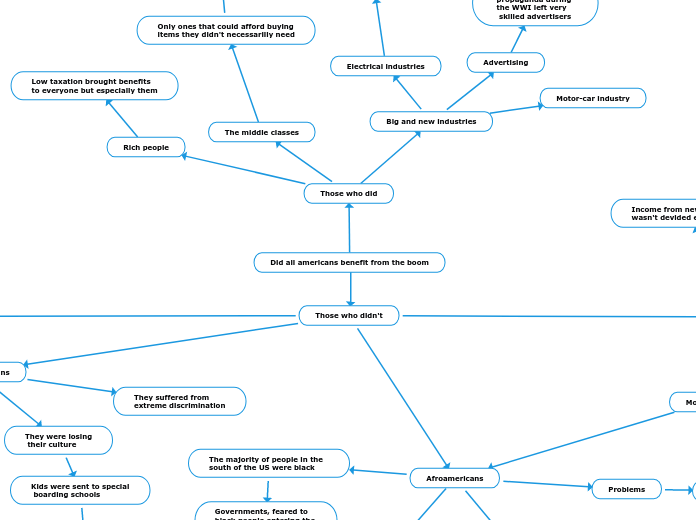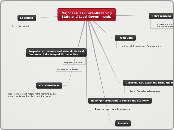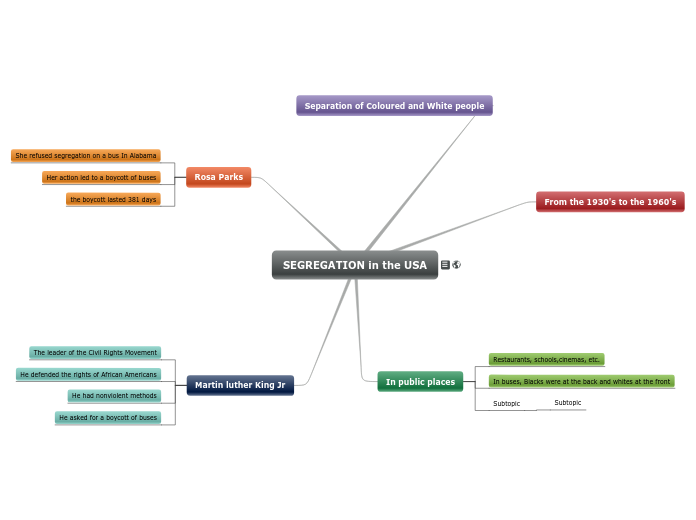Poorer education
$48 a week was the minimun required for living decently
Didn't suffer thanks to high tariffs of import
They were poorly paid
Competed with cheap labour in the south
Suffered from new synthetic materials
For instance, silk was replaced by rayon, a cheap subsitute
Electricity
Oil
Competition from new industries striked them
Textiles
Leather
Coal
Poor wage in 1928
42% of Americans lives in povery
70 hours a week
Female workers $9
Male workers $18
Motor-car industry
Mass nationwide
propaganda during
the WWI left very
skilled advertisers
'Industry Efficiency Movement'
was taken into account
Big and new industries
Advertising
Electrical industries
Only ones that could afford buying
items they didn't necessarilly need
Example: cars
Low taxation brought benefits
to everyone but especially them
Klu Klux Klan
White supremacy movement
James Cameron is a very famous case since in his book depicts his experience and probably the case of most afroamericans
President Wilson, as a consequence, became a powerful political force
"the decent american values against renegade black people and corrupt white Businessmen"
Those who did
Rich people
The middle classes
Did all americans benefit from the boom
Those who didn't
Native americans
They were losing
their culture
Kids were sent to special
boarding schools
To asimilate them
into white culture
They suffered from
extreme discrimination
Most of them live in
extreme poverty
Poorly paid jobs
Worse health-care
than white people
Lower life expectanty
than white people
Were forced to move
reservations in the mid-west
Most of their lands were taken
Workers
Few wokers belonged to a trade union
Income from new industries wasn't devided equally
Old Industries
Cotton
Unemployment was a problem
Mostly for
New jobs weren't created due to the growth of industry
New electrical and mechanised prodution
Afroamericans
Problems
Movements failed to change USA
They ended up living in ghettos
Most black people even in northern cities lived in poverty. They paid higher rents, had worse education and health service in comparison with whites
If they tried to move they had hostile reception. Poor whites considered them in the same way
Improvemments
In the north, black americans had a better quality of life
Politics
Marcus Garvey founded Universal Negro Improvement Association
Garvey set up a shipping line to support UNIA businesses and to help emigrate afroamericans
Expressed that black americans should be proud of their race and encouraged them to set up a business
WebDubois founded National Association for the Advancement of Colored People
Struggle with racial segregation laws and lynching ones, they weren't so effective but they changed a bit the society
Artists joined all together in a city where they magnet white people to bars and clubs
In Chicago and New York there was a small black middle class and a movement to encourage black people setting up a business
The majority of people in the south of the US were black
Governments, feared to black people entering the power
They restricted them to vote, access good jobs or good education
Agricultural area
Total US farm income dropped alomst it's 50% from 1919 to 1928
However, not all farmers were afected
Rich Americans still wanted their products, yet, it was a small amount of farmers who survived the crisis.
About half of all Americans werein the rural areas, yet, when they moved to the city, they were unskilled and no one wanted them, leading to unemployment
Some reasons
Falling prices
Prices fell by 50% and farmers were deseperated to sell their products
Hundreds of rural banks collapsed
Overproduction
From 1900 to 1920, with improved machinery and fertilisers, agriculture was doing great
But on the 20s, farms were producing more products wich nobody wanted.
Population
After the war, there was a time were the populaation was falling, so, there were less mouths to feed
Competition
New competition against Canadian wheat producers
Declining exports
After the war, Europe was poor and the US tariffs were too expensive to import food from the USA









